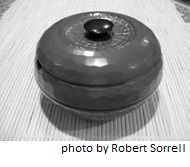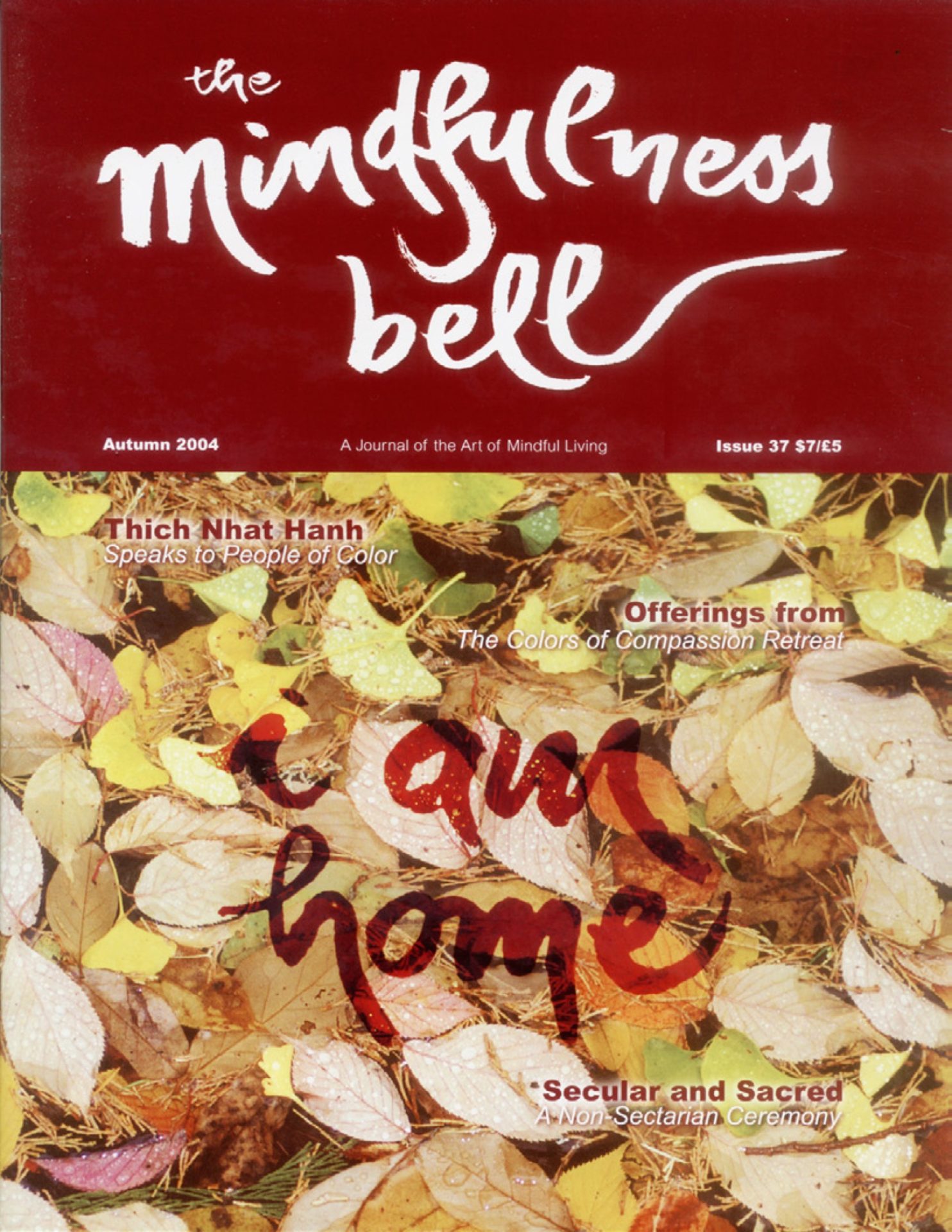A Commentary on Eating Meditation
by David Percival

At Plum Village and Deer Park, the food is delicious, nutritious, and abundant. During the first week of the Summer Opening at Plum Village, I was sitting outside waiting for everyone in my family group to arrive before starting to eat. In front of me was a large plate piled high with food, a large bowl full of food,
A Commentary on Eating Meditation
by David Percival

At Plum Village and Deer Park, the food is delicious, nutritious, and abundant. During the first week of the Summer Opening at Plum Village, I was sitting outside waiting for everyone in my family group to arrive before starting to eat. In front of me was a large plate piled high with food, a large bowl full of food, and a bowl of soup.
In the wonderful silence before starting to eat, I became aware that many of the monks at our table had just one bowl in front of them. Across from me was a slender, trim, happy monk with one small bowl of food; I had enough food to fill four small bowls. Some of the other retreatants at our table had equally impressive quantities of food. Over the next few days, I continued to observe that most monastics used only one bowl when serving themselves.
On the table was a small folded piece of cardboard with the important words I have been repeating for years, but somehow overlooked at this meal:
This food is the gift of the whole universe— the earth, the sky, and much hard work. May we be worthy to receive it. May we transform unskillful states of mind, especially the habit of eating without moderation. May we take only foods that nourish us and prevent illness. We accept this food to realize the path of understanding and love.
As I sat there, the Fifth Mindfulness Training played in my mind. What am I doing with this much food? By the time we began the meal, I wasn’t very hungry and I couldn’t eat it all. I waited until everyone had finished so I could steal away and discreetly put the remainder in the compost bucket. A wasteful but useful experience.
That evening during walking meditation I further contemplated this experience. Later, in Stepping into Freedom I read about the monastic eating bowl. Thay states that “…the monk’s eating bowl is often called ‘the vessel of appropriate measure’. It should be big enough to hold a suitable amount of food, but not too big as to encourage greed.”
Food portions served in restaurants at home seem to be escalating. I thought about the plague of obesity, eating disorders and addictions, diabetes, heart disease, loss of self-esteem, and other illnesses caused by being overweight. Reports suggest that two-thirds of adults in the
U.S. are overweight. There are untold numbers of diet plans, hundreds of books on how to lose weight, and millions of people desperately struggling to change. Food is a major attachment and can cause great suffering.
In this sea of suffering and despair is there a diet of mindfulness we can have with us always? Can we practice the Fifth Mindfulness Training at every meal?
The key is to practice as a monastic: wherever you go, keep your bowl carefully stored away in your consciousness. When you can, get used to using one small bowl or a salad plate for your meal. At home I have a Deer Park bowl as the centerpiece on our table and I look at it each time I sit down to eat.
When you can, serve yourself just what you need or perhaps a little less. Then practice walking meditation to where you sit, even if it’s just a few steps in your kitchen. Sit with your back straight, and practicing mindful breathing, recite the Five Contemplations. Bring yourself into the present moment so you can touch your food, your family, and your community deeply. Thay tells us that “eating in mindfulness nourishes your happiness, and you feel as though you are sharing a meal with the Buddha and his disciples in the Jeta Grove.”
Discussing the First Novice Precept, On Protecting Life, Thay says, “When a novice practices this precept, he or she learns to look at all beings with the eyes of compassion and thereby transforms the seeds of violence and hatred and nourishes the seeds of love. Violence and hatred cause boundless suffering. While a novice walks, sits, stands, lies down, works, speaks, eats, or drinks, she does not forget that all species are suffering. Protecting life is the first practice of someone cultivating her bodhicitta, her mind of love.” We can bring this teaching into our life by choosing a vegetarian diet.
My practice of eating moderate amounts of wholesome vegetarian food combined with exercise is a practice of love, compassion, and happiness. I begin to realize that craving for food is not an element of happiness. When I started this practice, I thought that I would need to give up many things. But over time I understood that when I let go of craving and attachments, I haven’t lost anything. Instead, a beautiful space opens in my mind as I become free from my food cravings and attachments. As Thay said at the Winter Retreat at Deer Park in March 2004, “Live in such a way that there is beauty in each moment—all our actions are our continuation (our karma). Do not wait!” And, never forget your bowl.
References:
Thich Nhat Hanh, Stepping into Freedom – An Introduction to Buddhist Monastic Training, Parallax Press, Berkeley, California, 1997. Thich Nhat Hanh, For a Future to Be Possible – Commentaries on the Five Wonderful Precepts, Parallax Press, Berkeley, California, 1993.
David Percival, True Wonderful Roots, lives in Albuquerque, New Mexico and is the subscription manager for the Mindfulness Bell.

